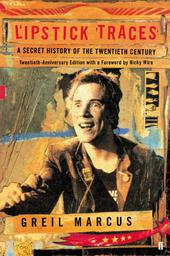
|
Lipstick Traces: A Secret History of the Twentieth Century
Paperback / softback
Main Details
| Title |
Lipstick Traces: A Secret History of the Twentieth Century
|
| Authors and Contributors |
By (author) Greil Marcus
|
| Physical Properties |
| Format:Paperback / softback | | Pages:496 | | Dimensions(mm): Height 235,Width 157 |
|
| Category/Genre | The arts - general issues |
|---|
| ISBN/Barcode |
9780571277100
|
| Classifications | Dewey:700.904 |
|---|
| Audience | |
|---|
| Edition |
Main
|
|
Publishing Details |
| Publisher |
Faber & Faber
|
| Imprint |
Faber & Faber
|
| Publication Date |
7 July 2011 |
| Publication Country |
United Kingdom
|
Description
This book is about a single, serpentine fact: late in 1976 a record called 'Anarchy in the UK' was issued in London, and this event launched a transformation of pop music all over the world. The song distilled, in crudely poetic form, a critique of modern society once set out by a small group of Paris intellectuals. In Lipstick Traces, Greil Marcus's classic book on punk, Dadaism, the situationists, medieval heretics and the Knights of the Round Table (amongst others), the greatest cultural critic of our times unravels the secret history of the twentieth century.
Author Biography
Greil Marcus was born in San Francisco in 1945. He is the author of Mystery Train, Invisible Republic, Lipstick Traces, and Double Trouble, and the editor of Lester Bangs' Psychotic Reactions and Carburetor Dung. In 1998 he curated the exhibition '1948' at the Whitney Museum of American Art in New York City. He was described by John Rockwell in the New York Times as 'a writer of rare perception and a genuinely innovative thinker'. Greil Marcus lives in California.
Reviews"Lipstick Traces" has the energy of its obsessions, and it snares you in the manner of those intense, questing and often stoned sessions of intellectual debate you may have experienced in your college years. It was destined, in other words, to achieve cult status.--Ben Brantley "New York Times " A coruscatingly original piece of work, vibrant with the energy of the bizarre happenings it maps out.--Terry Eagleton "New York Times Book Review " For anybody who wants to go deeper into the ontology of an idea that animates a kind of music, or is illuminated by that music, read Greil Marcus's "Lipstick Traces", just reissued in an expanded edition for the book's twentieth anniversary. I often say that "Traces" is the best book ever written about music, even though it's not actually about music: it is about the life of an idea.--Sasha Frere-Jones"New Yorker online" (10/21/2009) In 1989, Harvard University Press published "Lipstick Traces", the second book by the American writer and critic Greil Marcus. It was a dazzling creation, mapping out an untold "secret history" which connected the Sex Pistols, the Dadaists, the Parisian evenements of 1968, that legendary subversive clique the Situationist International and an Anabaptist revolt in 16th-century Germany, led by a notorious libertine named John of Leyden. Among the book's most ardent fans, it sparked real epiphanies...It stands as a singularly idiosyncratic product of a genre-cum-tradition rooted in the business of writing about musicians and the whirl of ideas that once surrounded them...[Marcus] manages some of the finest music writing ever to make it on to the page...My 20-year-old copy of "Lipstick Traces" is the one book I would save from my proverbial burning house.--John Harris"The Guardian" (06/27/2009) That Marcus can kick off and end his exhaustive, but always clear-headed, cross-epochal trek with the Sex Pistols--and make it all cohere--is but one indication of how fully he meshes the academy and the gutter.--Katherine Dieckmann "Voice Literary Supplement "
|